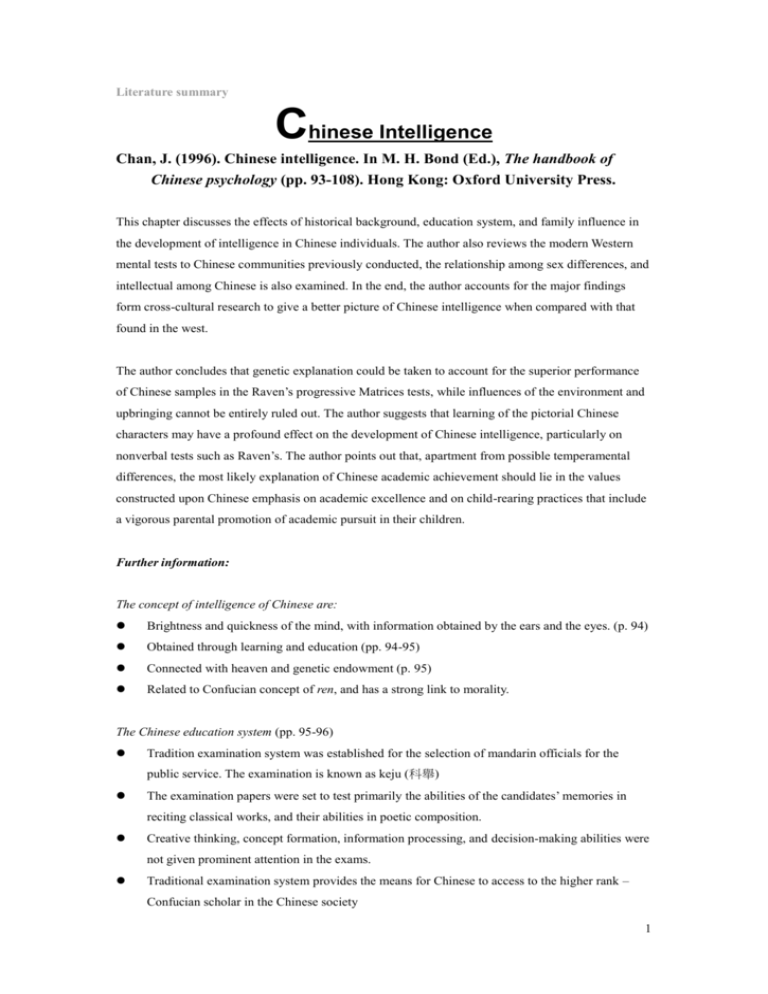
Literature summary
Chinese Intelligence
Chan, J. (1996). Chinese intelligence. In M. H. Bond (Ed.), The handbook of
Chinese psychology (pp. 93-108). Hong Kong: Oxford University Press.
This chapter discusses the effects of historical background, education system, and family influence in
the development of intelligence in Chinese individuals. The author also reviews the modern Western
mental tests to Chinese communities previously conducted, the relationship among sex differences, and
intellectual among Chinese is also examined. In the end, the author accounts for the major findings
form cross-cultural research to give a better picture of Chinese intelligence when compared with that
found in the west.
The author concludes that genetic explanation could be taken to account for the superior performance
of Chinese samples in the Raven’s progressive Matrices tests, while influences of the environment and
upbringing cannot be entirely ruled out. The author suggests that learning of the pictorial Chinese
characters may have a profound effect on the development of Chinese intelligence, particularly on
nonverbal tests such as Raven’s. The author points out that, apartment from possible temperamental
differences, the most likely explanation of Chinese academic achievement should lie in the values
constructed upon Chinese emphasis on academic excellence and on child-rearing practices that include
a vigorous parental promotion of academic pursuit in their children.
Further information:
The concept of intelligence of Chinese are:
Brightness and quickness of the mind, with information obtained by the ears and the eyes. (p. 94)
Obtained through learning and education (pp. 94-95)
Connected with heaven and genetic endowment (p. 95)
Related to Confucian concept of ren, and has a strong link to morality.
The Chinese education system (pp. 95-96)
Tradition examination system was established for the selection of mandarin officials for the
public service. The examination is known as keju (科舉)
The examination papers were set to test primarily the abilities of the candidates’ memories in
reciting classical works, and their abilities in poetic composition.
Creative thinking, concept formation, information processing, and decision-making abilities were
not given prominent attention in the exams.
Traditional examination system provides the means for Chinese to access to the higher rank –
Confucian scholar in the Chinese society
1
As the result, the education system is highly examination-oriented (and result-oriented)
Students in Hong Kong tend to study only material which will help them to achieve better results
in public examination, while acquisition of other life skills tends to be neglected.
Parents in Hong Kong tend to be practically oriented, wanting their children to get well-paid job
through obtaining a place in a renowned university.
Students are encouraged to put effort in achieving the ‘learning product’ rather than to understand
the ‘learning process’.
Problem-solving and creative thinking have not been encouraged or fostered and hence the
strength of Chinese intelligence may have been handicapped in these important areas.
Family influences (pp. 96-98)
Three interaction factors affecting child’s intelligence in the family: ‘treatment’, ‘teaching’ and
‘discipline’
Positive factors to academic performance in parent-child interaction:
More concerned and less restrictive fathers
Less restrictive but more autocratic mothers
Sex differences (pp. 100-102)
Generally, there are no sex differences on the intelligence scores measured by Raven’s
Progressive Matrices tests.
Hse (1971) found that boys performed better than did girls on Raven’s Colored Progressive Test
in primary schools, and the sex difference increased significantly form Primary 1 to Primary 3,
however; for secondary one students, no sex difference were found.
Dai and Lynn (1994) found from WISC results that Chinese boys in mainland China have higher
verbal and visual-spatial abilities, whereas girls are superior in memory.
Chan (1989) found that in Hong Kong, boys tend to do better in public examinations in the
science subjects of biology, chemistry, physics and mathematics, whereas girls tend to do better
in the arts subjects of Chinese, English, history and geography; Boys tend to excel in the
science-related university degree examinations, whereas girls tend to perform better in the
arts-related university degree examinations.
Chan’s (1989) finding may also reveal that girls may have better intellectual ability than boys in
language.
Conceptions of intelligence
The commonly agreed concepts related to intelligence (Among Chinese and Australians):
Spatial-mechanical (nonverbal) skill (most important)
Language (next most important)
Memory (retrieval of information) (the least important).
2






